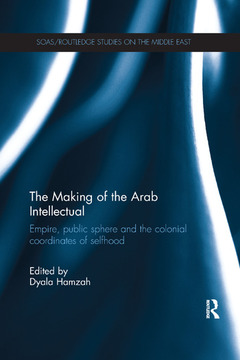Description
The Making of the Arab Intellectual
Empire, Public Sphere and the Colonial Coordinates of Selfhood
SOAS/Routledge Studies on the Middle East Series
Coordinator: Hamzah Dyala
Language: English
Subject for The Making of the Arab Intellectual:
Keywords
mount; lebanon; young; turk; revolution; syrian; protestant; college; mehmet; ali; Young Men; Caisse De La Dette Publique; Middle Eastern Jewish Communities; National Decadence; Imperial Gothic; Public Engagement; Dense; Young Effendiyya; Arabic; Arabic Language; Mount Lebanon; Comparative Literary History; Syrian Protestant College; Confer; Syrian Social Nationalist Party; Ottoman Arab World; Salīm; Peasant Question; Petit Bourgeois Attitude; Arab Intellectual; Arab Jewish; Arab Nationalist; Middle Eastern Jewish; Urban Intelligentsia; Jabal Druze
Publication date: 05-2017
· 15.6x23.4 cm · Paperback
Publication date: 11-2012
· 15.6x23.4 cm · Hardback
Description
/li>Contents
/li>Readership
/li>Biography
/li>
In the wake of the Ottoman Empire?s nineteenth-century reforms, as guilds waned and new professions emerged, the scholarly ?estate? underwent social differentiation. Some found employment in the state?s new institutions as translators, teachers and editors, whilst others resisted civil servant status. Gradually, the scholar morphed into the public writer. Despite his fledgling status, he catered for the public interest all the more so since new professionals such as doctors, engineers and lawyers endorsed this latest social role as an integral part of their own self-image.
This dual preoccupation with self-definition and all things public is the central concern of this book. Focusing on the period after the tax-farming scholar took the bow and before the alienated intellectual prevailed on the contemporary Arab cultural scene, it situates the making of the Arab intellectual within the dysfunctional space of competing states? interests known as the ?Nahda?. Located between Empire and Colony, the emerging Arab public sphere was a space of over- and under-regulation, hindering accountability and upsetting allegiances.
The communities that Arab intellectuals imagined, including the Pan-Islamic, Pan-Arab and socialist sat astride many a polity and never became contained by post-colonial states. Examining a range of canonical and less canonical authors, this interdisciplinary approach to The Making of the Modern Arab Intellectual will be of interest to students and scholars of the Middle East, history, political science, comparative literature and philosophy.
1. Introduction: The Making of the Arab Intellectual: Empire, Public Sphere and the Colonial Coordinates of Selfhood 2. Pharaoh’s Revenge: Translation, Literary History and Colonial Ambivalence 3. Public Deliberations of the Self in Fin-de-Siecle Egypt (1880-1910) 4. Inscribing Socialism into the Nahda: al-Muqtataf, al-Hilal, and the Construction of a Leftist Reformist Worldview, 1880-1914 5. From ‘Ilm to Sihafa or the Politics of the Public Interest (Maslaha): Muhammad Rashid Rida and his journal al-Manar (1898-1935) 6. Partitioned Pasts: Arab Jewish Intellectuals and the Case of Esther Azhari Moyal, 1873-1948 7. The "Mahjar" as literary and political territory in the first decades of the 20th century: the example of Amin Rihani (1876-1940) 8. The Generation of Broad Expectations: Nationalism, Education, and Autobiography in Syria and Lebanon, 1930-1958 9. Waiting for the Superman: A New Generation of Arab Nationalists in 1930s Iraq 10. Afterword
Dyala Hamzah is Assistant Professor of Middle East History at the Université de Montréal. She holds an M. Phil. in Philosophy from the Sorbonne and a Ph.D. in History and Islamic Studies from the Freie Universität Berlin and the EHESS (Paris). She is currently completing a book entitled Muhammad Rashīd Ridā (1865–1935) ou le “Tournant Salafiste”. Intérêt général, Islam et Opinion Publique dans l’Egypte Coloniale.




